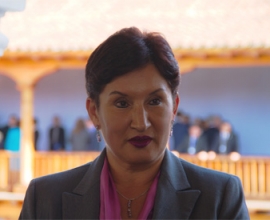"EUROsociAL helps us design public policies that address the problems of our countries"
30/09/2014
PrintThelma Aldana, Attorney General of the Republic of Guatemala, Head of the Public Prosecutor's Office.
What would you highlight about cooperation between the European Union and Latin America, and specifically regarding EUROsociAL with Guatemala?
The support of the EU and EUROsociAL is invaluable for my country and for the different Latin American States, given that we are thinking about social cohesion and, among other issues, the fight against poverty. Uniting the efforts of the different Latin American nations with the cooperation of EUROsociAL, based on its methodology of exchanging best practices and knowledge transfer, helps us design public policies that address the problems of our countries.
In this Programme meeting, the fight against gender violence has an important role. You, as the Attorney General of the Republic, are well acquainted with the policies designed to eradicate this social scourge. What can you tell us about this?
Whenever I have the opportunity to speak in public, I remind people that Guatemala is unfortunately in second place worldwide in terms of gender violence, and that although significant efforts have been made to incorporate women into economic, political and social orders, we still have an outstanding debt to the women of our countries, particularly to Guatemalan women.
What advances are taking place in Guatemala?
In 2008 Guatemala enacted a law against femicide and other forms of violence against women. This law classifies femicide, and sexual, psychological and economic violence against women as crimes. It represents a milestone in the history of this country—a before and after—because prior to 2008, violence against women was seen as something natural, as a very simple, minor offence that was not brought before the country's courts. After 2008, specifically in 2010, Guatemala promoted specialised justice with a gender focus, creating courts and tribunals specialised in femicide, violence against women, in addition to prosecutor's offices also specialised in criminal investigation of these crimes.
Describe the work with the European Union to increase efforts in this fight.
We hold various meetings with Latin American countries, and we share experiences and best practices to fight for the women of our countries as a block, and, of course, we have the support of the European Union. This support in the particular case of Guatemala is handled through the coordinating agency for modernisation of the justice sector, which is made up of the Judicial Body, the Judiciary, the Public Prosecutor's Office, the Ministry of Governance, and the Institute for Public Criminal Defence, through a grant to each of these institutions which also includes an axis for combating violence against women.
How much is left to be done?
We have a long road ahead of us in order for the women of our countries to have a life free of violence and a life project that allows them to act in society as citizens, remembering that respect for the human rights of women is the other face of democracy.
Enrique Martínez, responsable de comunicación de EUROsociAL / press officer of EUROsociAL

